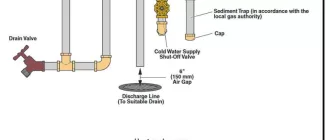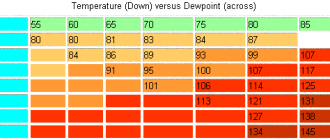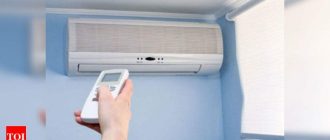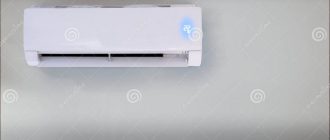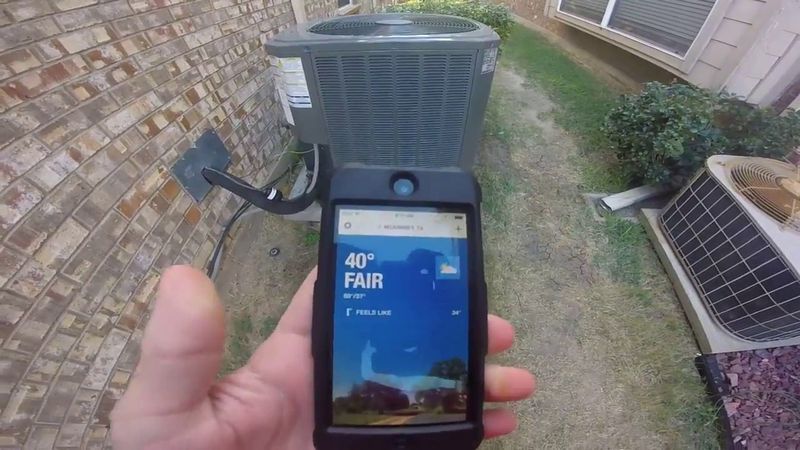
Can you use AC in 40 degree weather?
When the weather gets hot, many people turn to their trusty air conditioners to stay cool and comfortable. But what happens when the temperature outside reaches a scorching 40 degrees? Can you still use your AC safely in such extreme weather?
The short answer is yes, you can use your AC in 40 degree weather. Air conditioners are designed to cool down the air inside your home or office regardless of the temperature outside. However, there are a few important things to keep in mind to ensure the safety and efficiency of your AC unit during hot weather.
First, it’s important to make sure that your AC unit is properly maintained and functioning correctly. Regularly clean or replace the air filters to ensure good airflow and prevent any dust or debris from clogging the system. Additionally, check the refrigerant levels and make sure there are no leaks that could affect the cooling performance of your AC.
Tip: It’s a good idea to have your AC unit serviced by a professional before the hot weather hits to ensure it’s in good working condition.
Second, consider the temperature settings on your AC. When the outside temperature is very high, it’s tempting to set your AC to its lowest temperature setting. However, this can put a strain on the unit and potentially lead to malfunctions or overheating. Instead, try setting your AC to a comfortable temperature that is a few degrees cooler than the outside temperature.
Lastly, be mindful of energy consumption when using your AC in extreme weather. Running your AC for long periods of time at high temperatures can result in increased energy usage and higher electricity bills. Consider using energy-saving features on your AC, such as programmable timers or the “eco” mode, to help reduce energy consumption.
So, while it is safe to use an AC in 40 degree weather, it’s important to take some precautions to ensure its proper functioning and efficiency. By maintaining your AC unit, setting appropriate temperature levels, and being mindful of energy usage, you can stay cool and comfortable even in the hottest of weather.
Understanding Extreme Weather Conditions
In order to use an AC in 40 degree weather, it’s important to understand extreme weather conditions. Extreme weather conditions, such as extremely hot or cold temperatures, can present a number of challenges and risks. It’s crucial to take certain precautions and considerations when using an AC in these conditions.
When it comes to using an AC in 40 degree weather, it’s important to remember that extreme heat can put a strain on the unit and lead to potential malfunctions. ACs are typically designed to operate within a certain temperature range, and using them outside of this range can affect their performance and longevity.
Additionally, using an AC in extreme cold weather can also lead to issues. Cold temperatures can cause the AC’s refrigerant or condenser coils to freeze, leading to problems with the unit’s functionality. It’s important to ensure that the AC is properly insulated and protected from the cold to prevent these issues.
If you do choose to use an AC in 40 degree weather, there are some precautions you can take to help ensure safe and effective usage. First, make sure that the AC is properly maintained and serviced regularly to ensure optimal performance. This includes cleaning or replacing air filters, checking for any leaks, and inspecting the unit for any signs of damage.
Another important consideration is the use of appropriate fan settings. During extreme weather conditions, it may be necessary to adjust the fan settings to prevent the unit from working too hard or not providing sufficient cooling. It’s recommended to consult the AC’s user manual or seek professional advice to determine the best settings for your specific unit.
In conclusion, while it is possible to use an AC in 40 degree weather, it’s crucial to understand the potential risks and challenges that may arise. Taking appropriate precautions, such as proper maintenance and adjusting fan settings, can help ensure safe and effective usage of your AC in extreme weather conditions.
Impacts of High Temperature on AC Units
Using an AC in 40 degree weather can have several impacts on the unit. The high temperature puts a significant strain on the AC system, causing it to work harder and potentially leading to malfunctions or breakdowns.
Firstly, the compressor, which is responsible for cooling the air, may overheat in hot weather. When the ambient temperature is already high, the compressor has to work even harder to bring down the temperature, leading to increased stress on the unit. Over time, this can cause irreversible damage and require costly repairs.
In addition, using an AC in extreme weather conditions can result in decreased cooling efficiency. The air conditioner may struggle to lower the temperature as desired, leading to less effective cooling and a less comfortable indoor environment.
Furthermore, running an AC in 40 degree weather for extended periods can also lead to excessive condensation. When the warm outdoor air comes into contact with the cold AC coils, it causes condensation to form. This excess moisture can then cause issues such as mold growth or damage to the AC unit itself.
It is worth noting that most AC units are not designed to operate in such high temperatures. The manufacturer’s recommendations typically include temperature ranges within which the AC can safely and efficiently operate. Using an AC outside of these recommended temperature ranges can void the warranty and potentially cause long-term damage to the unit.
In conclusion, while it is technically possible to use an AC in 40 degree weather, doing so can have negative impacts on the unit. From increased strain on the compressor to decreased cooling efficiency and excessive condensation, it is generally advised to avoid using an AC in extreme temperatures. It is recommended to consult the manufacturer’s guidelines and seek professional advice to ensure the safe and proper use of an AC in varying weather conditions.
How AC Units Work in Extreme Heat
In extreme heat, it is important to understand how an AC unit functions and whether it is safe to use. When the temperature rises to 40 degrees, using an AC unit can be beneficial, but it is essential to take certain precautions.
An AC unit works by pulling warm air from the room and cooling it through its refrigeration cycle. The unit contains a compressor, condenser, expansion valve, and evaporator that work together to remove heat from the air and release it outside.
In 40-degree weather, the AC unit can still effectively cool the air. However, it is crucial to ensure that the AC unit is properly maintained and serviced. The filters need to be clean and free of any dirt or debris. Proper insulation is also necessary to prevent the warm air from entering the room.
It is recommended to set the AC unit at a moderate temperature to prevent it from overworking and potentially causing damage. Additionally, using a programmable thermostat can help maintain a comfortable temperature while reducing energy consumption.
While utilizing an AC unit in 40-degree weather is generally safe, it is essential to use common sense and pay attention to any signs of overheating or malfunction. If the AC unit is struggling to cool the room or making unusual noises, it is best to turn it off and seek professional assistance.
In conclusion, an AC unit can still be used in 40-degree weather to provide cooling relief. However, proper maintenance and precautions should be taken to ensure its safe and efficient operation.
Is it Safe to Operate an AC in 40 Degree Weather?
Operating an AC in 40 degree weather can be safe, but it is important to consider a few factors before turning on your air conditioning unit in such cold temperatures. AC units are generally designed to cool the air, so using them in extremely cold weather may not be efficient and could potentially damage the unit.
Here are a few things to keep in mind:
- Efficiency: AC units are most efficient when the temperature is above 60 degrees Fahrenheit. When the temperature drops to 40 degrees or below, the AC unit may struggle to cool the air effectively. This can lead to reduced performance and increased energy consumption.
- Potential damage: Running an AC unit in very cold weather can cause the compressor to work harder than necessary. This can lead to increased wear and tear on the unit and potentially result in a breakdown or other damage.
- Frost build-up: In extremely cold weather, the AC unit’s condenser coils can develop frost or ice build-up. This can cause the unit to malfunction and may require professional repair or defrosting.
If you need to cool your home in 40 degree weather, it is recommended to use other methods such as opening windows, using fans, or adjusting your thermostat to a higher temperature. This will help you avoid potential damage to your AC unit and ensure efficient cooling in your home.
In conclusion, while it may be technically safe to operate an AC in 40 degree weather, it is not recommended due to potential inefficiency, increased wear and tear, and the risk of frost build-up. It is best to explore alternative cooling methods in colder temperatures to keep your AC unit in good condition.
Potential Risks of Operating an AC in Extreme Weather
Using an AC in extreme weather conditions, such as 40-degree weather, can pose certain risks to both the user and the AC system itself. It is important to be aware of these risks before deciding to use an AC in such weather.
1. Overloading the AC: Operating an AC in extreme weather can put a significant strain on the system. The AC may have to work harder to cool the air to the desired temperature, leading to increased energy consumption and potential damage to the AC unit.
2. Potential Health Issues: Using an AC in extremely cold temperatures can result in excessively low indoor temperatures. This can lead to health issues such as hypothermia or frostbite, especially if proper insulation and heating measures are not in place.
3. Inefficient Cooling: AC systems are designed to efficiently cool the air within a certain temperature range. Using an AC in extreme cold weather may cause the system to cycle on and off more frequently, resulting in inefficient cooling and poor climate control.
4. Icing: Operating an AC in extremely cold temperatures can cause the condensation on the evaporator coils to freeze, leading to icing. This can restrict airflow and decrease the efficiency of the AC, potentially causing damage to the system.
5. Increased Energy Consumption: Using an AC in extreme weather conditions, especially in high temperatures, can result in increased energy consumption and higher electricity bills. The AC may have to run for longer periods of time to maintain the desired indoor temperature.
6. Risk of AC Failure: Continuous operation of an AC in extreme weather conditions can increase the risk of AC failure. The strain on the AC system can cause components to wear out more quickly, leading to frequent breakdowns and the need for costly repairs.
It is advisable to take necessary precautions and consider alternative cooling options in extreme weather conditions. Consulting with a professional HVAC technician can help determine the best course of action for your specific situation.
Precautions to Take Before Using an AC in 40 Degree Weather
In hot weather conditions, using an air conditioner (AC) can provide relief from the sweltering heat. However, when the temperature reaches extreme levels, such as 40 degrees Celsius, precautions must be taken to ensure the safe and effective use of an AC.
Here are some essential precautions to consider before using an AC in 40 degree weather:
- Ensure your AC unit is in proper working condition: Before the hot weather arrives, it is crucial to have your AC unit inspected and serviced by a professional technician. This will help identify any potential issues and ensure that your AC is functioning optimally.
- Keep the AC filters clean: Clean air filters will help maintain the efficiency of your AC unit. In extreme temperatures, the AC unit will be working harder to cool the air, and dirty filters can restrict the airflow. Regularly cleaning or replacing the filters is vital to ensure the smooth operation of the AC.
- Keep windows and doors closed: When using an AC, it is essential to keep all windows and doors closed to prevent outside heat from entering the room. This will help maintain a cool and comfortable indoor environment.
- Do not set the AC temperature too low: While it may be tempting to set the AC at the lowest possible temperature, it is not advisable. Extremely low temperatures can put a strain on the AC unit and increase energy consumption. Optimum temperature settings would be around 22-24 degrees Celsius for a comfortable and energy-efficient cooling experience.
- Use a programmable thermostat: A programmable thermostat can help regulate the temperature and save energy. It allows you to set different temperature levels for different times of the day, ensuring that the AC operates efficiently without wasting energy.
- Stay hydrated: High temperatures can cause dehydration. It is essential to keep yourself hydrated by drinking plenty of water, especially when using an AC. The cool air from the AC can sometimes give a false sense of comfort, leading to less water intake. Remember to drink water regularly to stay hydrated.
- Consider using additional cooling methods: In extreme heat conditions, it may be helpful to use additional cooling methods, such as ceiling fans, curtains, or shades. These measures can help reduce the load on the AC unit and provide extra cooling to the room.
By following these precautions, you can ensure the safe and effective use of an AC in 40-degree weather, providing you with much-needed relief from the scorching heat.
Tips for Using an AC in Hot Weather
When the weather reaches 40 degrees, it can be a real challenge to stay cool and comfortable. Using an AC in such extreme heat is essential, but it’s important to use it wisely to prevent any damage or safety risks.
Here are some tips for using an AC in hot weather:
1. Set the temperature appropriately: It’s tempting to set the AC to the lowest temperature possible when it’s scorching hot outside. However, setting it around 22-24 degrees Celsius (72-75 degrees Fahrenheit) is usually sufficient to maintain a comfortable indoor temperature without overloading the AC unit.
2. Use a programmable thermostat: If you have a programmable thermostat, take advantage of its features. Set it to automatically adjust the temperature based on your schedule, turning off or reducing the cooling when you’re not at home.
3. Keep windows and doors closed: Make sure all windows and doors are properly sealed to prevent warm air from entering your home. This will help your AC work more efficiently and keep the indoor temperature lower.
4. Use fans: Use ceiling fans or portable fans to help distribute the cool air more effectively throughout your home. This can help reduce the workload on your AC unit and make you feel more comfortable.
5. Perform regular maintenance: Keep your AC unit in good condition by performing regular maintenance, such as cleaning or replacing filters, checking for any leaks, and ensuring proper airflow. This will help extend the lifespan of your AC unit and improve its efficiency.
Remember, using an AC in hot weather can provide much-needed relief, but it’s important to use it responsibly and efficiently to avoid energy waste and potential damage.
Signs of Overheating in AC Units
When it comes to using an AC in 40 degree weather, there are some signs of overheating that you should be aware of. Running your AC unit in extremely hot weather can put a significant strain on the system and potentially cause it to overheat. Here are some signs that your AC unit may be overheating:
| The AC unit is blowing warm air instead of cold air. |
| You notice unusual noises coming from the AC unit. |
| The AC unit is continuously running without cycling off. |
| The AC unit’s exterior is hot to the touch. |
| You detect a burning smell coming from the AC unit. |
| The circuit breaker for the AC unit keeps tripping. |
If you experience any of these signs, it is important to turn off your AC unit immediately and wait for it to cool down before attempting to use it again. Continuing to use an overheating AC unit can lead to further damage and potentially be a fire hazard. It is always best to have a professional HVAC technician inspect your AC unit to determine the cause of the overheating and make any necessary repairs.
How to Handle an Overheating AC Unit
If the temperature reaches 40 degrees Celsius or higher and you are using an AC unit, there is a risk of it overheating. Here are some tips on how to handle an overheating AC unit:
1. Turn off the AC: If you notice that your AC unit is overheating, the first step is to turn it off immediately. This will prevent any further damage to the unit and reduce the risk of a fire.
2. Check the air filters: Over time, air filters can get clogged with dust and debris, which can restrict airflow and cause the AC unit to overheat. Check the air filters and clean or replace them if necessary.
3. Clean the condenser coils: Dirt and debris can accumulate on the condenser coils, reducing their efficiency and causing the AC unit to work harder, leading to overheating. Clean the condenser coils regularly to ensure proper airflow and prevent overheating.
4. Clear the area around the AC unit: Make sure that there is no furniture, curtains, or any other obstructions blocking the airflow around the AC unit. Proper airflow is important for the AC unit to function efficiently and prevent overheating.
5. Schedule regular maintenance: AC units require regular maintenance to keep them running smoothly and prevent overheating. Hire a professional to inspect and service your AC unit at least once a year to ensure optimal performance.
Remember, an overheating AC unit can be dangerous and may cause a fire. It is important to take immediate action if you notice any signs of overheating to prevent any further damage.
Benefits of Using an AC in Hot Weather
Using an AC can provide several benefits in hot weather, especially when the temperatures reach 40 degrees.
- Cool and comfortable environment: An AC helps to create a cool and comfortable indoor atmosphere, making it easier to relax and unwind, even when the weather outside is scorching hot.
- Improved sleep quality: Sleeping in a cool room can promote better sleep by regulating your body temperature and making it easier to fall asleep and stay asleep throughout the night.
- Reduced risk of heat-related illnesses: In extreme heat, there is a higher risk of heat-related illnesses such as heat exhaustion and heatstroke. Using an AC can help to lower the temperature and humidity indoors, reducing the risk of these conditions.
- Increased productivity: High temperatures can make it difficult to focus and concentrate. By using an AC, you can create a cool and comfortable working environment, leading to increased productivity and efficiency.
- Better air quality: AC units often have filters that can help to improve indoor air quality by trapping dust, pollen, and other airborne particles. This is especially beneficial for individuals with allergies or respiratory conditions.
- Protection of furniture and electronics: Excessive heat and humidity can damage furniture, woodwork, and electronics. Using an AC can help to maintain stable and optimal conditions, preventing such damage.
Overall, using an AC in hot weather can provide numerous advantages, ensuring your comfort, health, and well-being, even when the temperatures soar to 40 degrees.
Energy Efficiency Tips for Using an AC in Extremely Hot Weather
When the weather reaches extreme high temperatures, around 40 degrees, it can be tempting to crank up the air conditioning to keep cool. However, using your AC in hot weather can lead to high energy consumption and increased utility bills. Here are some energy efficiency tips to help you stay cool while keeping your energy usage under control:
| Set the thermostat to a higher temperature | Instead of setting your AC to the lowest temperature possible, try setting it to a temperature that still provides comfort but is slightly higher. This can help reduce energy usage. |
| Use ceiling fans | Using ceiling fans in conjunction with your AC can help circulate cool air more efficiently, allowing you to set the thermostat at a higher temperature without sacrificing comfort. |
| Keep windows and doors closed | Make sure all windows and doors are closed properly to prevent warm air from entering your home and cool air from escaping. This can help your AC work more efficiently. |
| Keep blinds or curtains closed | Direct sunlight entering your home can increase indoor temperatures. By keeping blinds or curtains closed during the hottest parts of the day, you can reduce solar heat gain and help your AC cool your home more effectively. |
| Seal air leaks | Check for air leaks around windows, doors, and ducts. Sealing these leaks can prevent cool air from escaping and hot air from entering, improving your AC’s efficiency. |
By following these energy efficiency tips, you can still use your AC in extremely hot weather but minimize the impact on your energy consumption and utility bills. Stay cool and save energy!
Proper Maintenance of AC Units in Hot Weather
In hot weather, it is crucial to properly maintain your AC unit to ensure its optimal performance and longevity. Neglecting maintenance can lead to reduced cooling capacity, decreased energy efficiency, and potentially costly repairs. Here are some essential tips to help you keep your AC unit running smoothly:
Regularly clean or replace filters: Dirty or clogged filters can restrict airflow and reduce the cooling capacity of your AC unit. Cleaning or replacing the filters every one to three months can help maintain optimal airflow and improve indoor air quality.
Clean the condenser coils: Over time, the condenser coils of your AC unit can accumulate dirt, dust, and debris, decreasing their efficiency. Regularly cleaning the condenser coils using a soft brush or vacuum can enhance the performance of your AC unit.
Keep the surrounding area clear: Ensure that the area around your AC unit is free from obstructions such as plants, leaves, or debris. Allowing proper airflow around the unit can help it operate efficiently.
Inspect and clean the evaporator coils: The evaporator coils inside your AC unit can also accumulate dirt and dust, hindering their ability to cool the air effectively. Inspecting and cleaning the evaporator coils can help improve the overall performance of your AC unit.
Check for refrigerant leaks: Low refrigerant levels can reduce the cooling capacity of your AC unit. If you notice reduced cooling or ice formation on the unit, it may indicate a refrigerant leak. In such cases, it is best to call a professional AC technician to check and repair the leak.
Ensure proper insulation: Properly insulate your home to minimize the heat gain and workload on your AC unit. Good insulation can help maintain a comfortable indoor temperature and reduce the strain on your AC system.
Schedule regular professional maintenance: It is recommended to schedule regular maintenance by a professional AC technician. They can inspect, clean, and tune-up your AC unit to ensure its optimal performance and identify any potential issues before they become major problems.
By following these essential maintenance tips, you can ensure that your AC unit operates efficiently in hot weather and enjoy a comfortable indoor environment throughout the hot summer months.
Alternative Cooling Options for Extreme Heat
When the weather reaches extreme temperatures, it’s important to stay cool and comfortable. While using an AC might be a common choice, there are alternative cooling options you can consider. Here are a few options that you can use in 40-degree weather:
Fans: Using fans can help circulate the air and create a breeze, providing some relief from the heat. You can use ceiling fans, portable fans, or even desk fans to cool down your immediate surroundings.
Shades and Curtains: Blocking out sunlight can significantly reduce the heat inside your home. Use shades, curtains, or blinds to cover windows during the hottest parts of the day. This can help keep your home cooler without relying solely on air conditioning.
Insulation: Proper insulation can make a significant difference in maintaining a comfortable temperature indoors. Insulate your home by sealing any gaps or cracks, adding insulation to the walls and attic, and ensuring that windows and doors are properly sealed. This will help keep the cool air in and the hot air out.
Cooling Sprays or Mists: Using cooling sprays or mists can help cool down your body temperature quickly. These sprays usually contain menthol or other cooling agents that provide a refreshing sensation when applied to the skin.
Cold Showers: Taking cold showers can instantly lower your body temperature and provide temporary relief from the heat. It’s a quick and easy way to cool down when the weather is scorching.
Damp Towels: Placing damp towels on your neck or forehead can provide instant relief from the heat. The evaporation of water from the towel helps cool down the skin, providing a refreshing sensation.
Hydration: Staying hydrated is crucial in extreme heat. It helps regulate your body temperature and prevents dehydration. Drink plenty of water throughout the day, even if you don’t feel thirsty. Avoid alcohol and caffeine, as they can dehydrate your body.
These alternative cooling options can be effective in helping you stay cool in 40-degree weather without relying solely on an AC. Mix and match these options to find what works best for you and your comfort level.
Q&A:
Is it safe to use an AC in extremely hot weather?
Yes, it is safe to use an AC in extremely hot weather. Air conditioning systems are designed to cool and dehumidify the air, making it more comfortable indoors.
Can using an AC in hot weather cause any health problems?
Using an AC in hot weather does not usually cause health problems. In fact, it can help prevent heat-related illnesses by maintaining a comfortable temperature and reducing humidity.
Does using an AC in hot weather consume a lot of electricity?
Yes, using an AC in hot weather can increase electricity consumption. However, newer models are designed to be more energy-efficient, so the impact on your electricity bill may not be significant.
Is it necessary to use an AC in 40-degree weather?
No, it is not necessary to use an AC in 40-degree weather. In fact, it is recommended to turn off the AC or adjust the temperature to a higher setting to save energy and reduce electricity consumption.
Can using an AC in extremely hot weather cause the system to overheat?
No, using an AC in extremely hot weather does not cause the system to overheat. AC systems are designed to operate in hot temperatures and have safety measures in place to prevent overheating.

